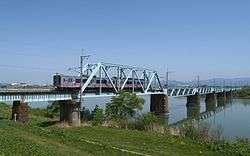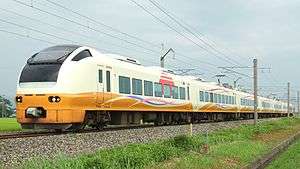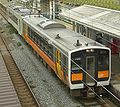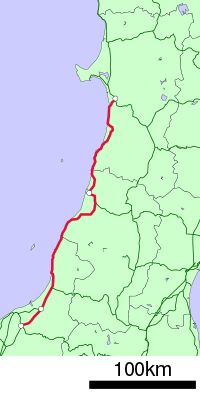Uetsu Main Line
The Uetsu Main Line (羽越本線, Uetsu-hon-sen) is a railway line in the Tohoku and Chubu regions of Japan. Part of the East Japan Railway Company (JR East) system, it connects Niitsu Station in the city of Niigata and Akita Station in Akita. The name "Uetsu" refers to the ancient provinces of Dewa (出羽) and Echigo (越後), which the line connects.
| Uetsu Main Line | |||
|---|---|---|---|
Kirakira Uetsu (Joyful Train) | |||
| Overview | |||
| Native name | 羽越本線 | ||
| Type | Heavy rail | ||
| System | JR East | ||
| Status | Operating | ||
| Locale | Niigata, Yamagata, Akita Prefectures | ||
| Termini | Niitsu Station Akita Station | ||
| Stations | 61 | ||
| Operation | |||
| Opened | September 2, 1912 | ||
| Owner | |||
| Operator(s) | |||
| Technical | |||
| Track length | 274.4 km | ||
| Track gauge | 1,067 mm (3 ft 6 in) 1,435 mm (4 ft 8 1⁄2 in) | ||
| Electrification | 1,500 V DC, 20 kV AC 50 Hz | ||
| Operating speed | 120 km/h (75 mph) | ||
| |||
.jpg)
Route data
- Total length: 274.4 km (Fukushima–Aomori, Tsuchizaki–Akitakō)
- Operators, distances:
.svg.png)
- Niitsu — Akita: 271.7 km
.svg.png)
- Sakata — Sakata-Minato: 2.7 km
.svg.png)
- Niitsu — Akita: 271.7 km
- Tracks:
- See station list for details
- Electrification:
- Niitsu — Murakami: 1,500 V DC
- Murakami — Akita: 20 kV AC, 50 Hz
- Railway signalling:
- Maximum speed:
- Niitsu — Murakami: 120 km/h
- Murakami — Imagawa: 100 km/h
- Imagawa — Sanze: 95 km/h
- Sanze — Sakata: 120 km/h
- Sakata — Akita: 95 km/h
Services
- Limited express, Rapid
As of March 2020, the following services are operated.
| Name | Route | Service frequency (daily) |
|---|---|---|
| Limited Express Inaho | (Niigata) – Shibata – Sakata/Akita | 7 return trips |
| Rapid Kairi | (Niigata) – Shibata – Sakata | 1 return trip (weekends only) |
| Rapid Rakuraku Train Murakami | (Niigata) – Shibata – Murakami | 1 down trip |
| Rapid Benibana | (Niigata) – Shibata – Sakamachi – (Yonezawa) | 1 return trip |
- Local
- Niitsu – Shibata: every 60-180 minutes
- Shibata – Murakami: every 60-120 minutes
- Murakami – Sakata: every 60-180 minutes
- Sakata – Akita: every 60-180 minutes
Between Shibata and Murakami, most of the local trains travel through to/from Niigata via Hakushin Line.
Stations
- A: Limited Express Inaho
- B: Rapid Kairi
- C: Rapid Rakuraku Train Murakami, Benibana and other Rapid service trains
- Trains stop at stations marked "O", skip at stations marked "|".
| Station | Japanese | Distance (km) | A | B | C | Transfers | DC/AC | Location | |||
|---|---|---|---|---|---|---|---|---|---|---|---|
| Between stations |
Total | ||||||||||
| Niitsu | 新津 | - | 0.0 | Via Hakushin Line |
∨ | 1,500 V DC |
Akiha-ku, Niigata | Niigata | |||
| Kyōgase | 京ヶ瀬 | 6.1 | 6.1 | ◇ | Agano | ||||||
| Suibara | 水原 | 4.1 | 10.2 | ◇ | |||||||
| Kamiyama | 神山 | 3.7 | 13.9 | | | |||||||
| Tsukioka | 月岡 | 3.9 | 17.8 | ◇ | Shibata | ||||||
| Nakaura | 中浦 | 3.7 | 21.5 | | | |||||||
| Shibata | 新発田 | 4.5 | 26.0 | O | O | O | ■Hakushin Line (some trains through to Murakami) | ^ | |||
| Kaji | 加治 | 4.3 | 30.3 | | | | | |[* 1] | ∥ | ||||
| Kanazuka | 金塚 | 5.0 | 35.3 | | | | | | | ∨ | ||||
| Nakajō | 中条 | 3.8 | 39.1 | O | O | O | ^ | Tainai | |||
| Hirakida | 平木田 | 5.6 | 44.7 | | | | | | | ∥ | ||||
| Sakamachi | 坂町 | 3.3 | 48.0 | O | O | O | ■Yonesaka Line | ∥ | Murakami | ||
| Hirabayashi | 平林 | 3.6 | 51.6 | | | | | | | ∨ | ||||
| Iwafunemachi | 岩船町 | 3.6 | 55.2 | | | | | | | ◇ | ||||
| Murakami | 村上 | 4.2 | 59.4 | O | O | O | ^ | ||||
| Majima | 間島 | 7.1 | 66.5 | | | | | ∨ | 20 kV AC 50 Hz | ||||
| Echigo-Hayakawa | 越後早川 | 4.9 | 71.4 | | | | | ^ | |||||
| Kuwagawa | 桑川 | 6.9 | 78.3 | | | O | ∨ | |||||
| Imagawa | 今川 | 4.3 | 82.6 | | | | | ◇ | |||||
| Echigo-Kangawa | 越後寒川 | 4.9 | 87.5 | | | | | ^ | |||||
| Gatsugi | 勝木 | 5.3 | 92.8 | | | | | ∨ | |||||
| Fuya | 府屋 | 3.1 | 95.9 | O | | | ^ | |||||
| Nezugaseki | 鼠ヶ関 | 5.1 | 101.0 | | | | | ∥ | Tsuruoka | Yamagata | |||
| Koiwagawa | 小岩川 | 4.4 | 105.4 | | | | | ∨ | |||||
| Atsumi Onsen | あつみ温泉 | 4.4 | 109.8 | O | O | ^ | |||||
| Iragawa | 五十川 | 5.9 | 115.7 | | | | | ∥ | |||||
| Kobato | 小波渡 | 4.4 | 120.1 | | | | | ∥ | |||||
| Sanze | 三瀬 | 3.1 | 123.2 | | | | | ∥ | |||||
| Uzen-Mizusawa | 羽前水沢 | 5.7 | 128.9 | | | | | ∥ | |||||
| Uzen-Ōyama | 羽前大山 | 4.5 | 133.4 | | | | | ∨ | |||||
| Tsuruoka | 鶴岡 | 6.0 | 139.4 | O | O | ◇ | |||||
| Fujishima | 藤島 | 6.6 | 146.0 | | | | | ^ | |||||
| Nishibukuro | 西袋 | 5.1 | 151.1 | | | | | ∥ | Shōnai, Higashitagawa | ||||
| Amarume | 余目 | 3.6 | 154.7 | O | O | ■Rikuu West Line[* 2] | ∥ | ||||
| Kita-Amarume | 北余目 | 2.7 | 157.4 | | | | | ∥ | |||||
| Sagoshi | 砂越 | 3.0 | 160.4 | | | | | ∥ | Sakata | ||||
| Higashi-Sakata | 東酒田 | 3.3 | 163.7 | | | | | ∥ | |||||
| Sakata | 酒田 | 3.2 | 166.9 | O | O | JR Freight Uetsu Freight Branch Line (to Sakata-Minato) |
∥ | ||||
| Mototate | 本楯 | 6.4 | 173.3 | | | ∨ | ||||||
| Minamichōkai | 南鳥海 | 2.6 | 175.9 | | | ◇ | ||||||
| Yuza | 遊佐 | 3.2 | 179.1 | O | ^ | Yuza, Akumi | |||||
| Fukura | 吹浦 | 7.0 | 186.1 | | | ∨ | ||||||
| Mega | 女鹿 | 3.6 | 189.7 | | | ◇ | ||||||
| Kosagawa | 小砂川 | 5.1 | 194.8 | | | ◇ | Nikaho | Akita | ||||
| Kamihama | 上浜 | 3.7 | 198.5 | | | ◇ | ||||||
| Kisakata | 象潟 | 4.9 | 203.4 | O | ◇ | ||||||
| Konoura | 金浦 | 5.8 | 209.2 | | | ^ | ||||||
| Nikaho | 仁賀保 | 5.5 | 214.7 | O | ∨ | ||||||
| Nishime | 西目 | 8.4 | 223.1 | | | ^ | Yurihonjō | |||||
| Ugo-Honjō | 羽後本荘 | 5.8 | 228.9 | O | O | ■Yuri Kōgen Railway Chōkai Sanroku Line | ∥ | ||||
| Ugo-Iwaya | 羽後岩谷 | 7.1 | 236.0 | | | O | ∥ | |||||
| Oriwatari | 折渡 | 4.7 | 240.7 | | | ↓ | ∨ | |||||
| Ugo-Kameda | 羽後亀田 | 3.0 | 243.7 | | | O | ◇ | |||||
| Iwaki-Minato | 岩城みなと | 6.5 | 250.2 | | | ↓ | | | |||||
| Michikawa | 道川 | 1.6 | 251.8 | | | ↓ | ^ | |||||
| Shimohama | 下浜 | 6.6 | 258.4 | | | ↓ | ∨ | Akita | ||||
| Katsurane | 桂根 | 3.4 | 261.7 | | | ↓ | ◇ | |||||
| Araya | 新屋 | 4.0 | 265.7 | | | O | ◇ | |||||
| Ugo-Ushijima | 羽後牛島 | 3.3 | 269.0 | | | O | ◇ | |||||
| Akita | 秋田 | 2.7 | 271.7 | O | O | ^ | |||||
- Only 1 up rapid service in the morning stops
- Most trains from Rikuu West Line terminate at Sakata Station
- The official beginning of the Oga Line is at Oiwake Station, but all trains terminate at Akita Station.
Symbols:
- | - Single-track
- ◇ - Single-track; station where trains can pass
- ^ - Double-track section starts from this point
- ∥ - Double-track
- ∨ - Single-track section starts from this point
Rolling stock
Present
Local
- E129 series 2/4-car DC EMUs (Niitsu—Murakami, since December 2014)
- 701 series 2/3-car AC EMUs (Sakata—Akita)
- KiHa 110 series (Niitsu - Nezugaseki)
- GV-E400 series (Niitsu-Sakata, since August 2019)
Inaho/Rakuraku Train Murakami
- E653-1000 series 7-car DC/AC EMUs (since September 2013)
Kairi
 701 series passing Omonogawa Bridge
701 series passing Omonogawa Bridge E653 series Inaho, near Higashi-Sakata Station
E653 series Inaho, near Higashi-Sakata Station Kairi at Shibata Station, April 2020
Kairi at Shibata Station, April 2020
Former
- 115 series DC EMUs (Niitsu—Murakami, until March 2018)
- E127-0 series 2-car DC EMUs (Shibata—Murakami, until March 2015)
- KiHa 40/47/48 series DMUs (Until March 2020)
- KiHa E120 DMUs (Niitsu—Sakata, until March 2018)
- KiHa 58 series DMUs
- KiHa 52 DMUs
- 485 series DC/AC EMUs (until July 2014) - Inaho, Hakucho, Rakuraku Train Murakami
 E127 series and 115 series at Murakami Station, March 2009
E127 series and 115 series at Murakami Station, March 2009 KiHa 40/47/48 series, Amarume - Nishibukuro, March 2017
KiHa 40/47/48 series, Amarume - Nishibukuro, March 2017 KiHa 40/47/48 series at Sakata Station, December 2012
KiHa 40/47/48 series at Sakata Station, December 2012 KiHa E120 and 110 at Sakamachi Station, July 2009
KiHa E120 and 110 at Sakamachi Station, July 2009 485 series Hakucho limited espress, Akita Station, 1987
485 series Hakucho limited espress, Akita Station, 1987- 485-3000 series Inaho limited express, Kosagawa - Kamihama, March 2014
History
The line was opened in sections between 1912 and 1924, and electrified in 1972, the same year CTC signalling was commissioned.
Work to double-track the line in sections commenced in 1957, and continued for 25 years until being suspended due to capital expenditure restrictions in 1983, at which time 51% of the route was double-tracked.
Accidents
On December 25, 2005, all six cars of a limited express train Inaho No.14 on the Uetsu Line derailed in Yamagata prefecture, about 350 kilometres (220 mi) north of Tokyo. The train was headed south towards Kita-Amarume Station. Three of the cars turned over, causing the deaths of five people and injuring 33 others. Three other persons were originally reported missing, but authorities later discovered that they had disembarked from the train before the accident.
References
| Wikimedia Commons has media related to Uetsu Main Line. |
- JR全線全駅ステーション倶楽部編(上) [Complete JR Line/Station Compendium (Vol. 1)] (in Japanese). Tokyo, Japan: Bunshun Bunko. September 1988. p. 236-248. ISBN 4-16-748701-2.
External links
- Inaho - JR East (in English)
- Kairi - JR East (in English)
- Discover Uetsu, tourist website (in English)
